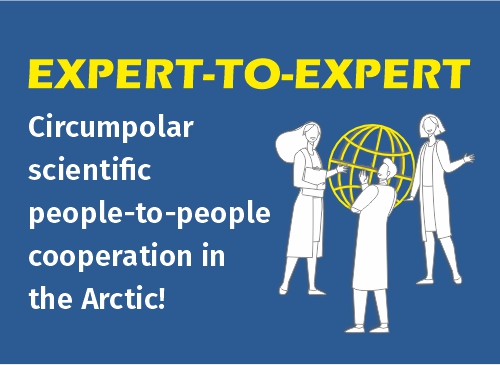The first Expert-to-Expert initiative’s webinar “Climate change and the Arctic: state of the art and what kind of scientific cooperation is most needed?” took place 15 December 2022.

The purpose of the Arctic expert-to-expert initiative is to continue dialogue and exchange of knowledge between transdisciplinary Arctic experts of all nations. The event gathered diverse researchers from social sciences, biology, Arctic geopolitics and science diplomacy in the Arctic.
In his opening remarks, Halldór Jóhannsson, the founder of the Arctic Portal, introduced the People-to-People initiative, the Arctic Portal and other online Arctic resources to the benefit of all.
Increased Arctic data gap
Ekaterina Uryupova, Senior Fellow at The Arctic Institute discussed the Arctic scientific community's "data gaps" and challenges. This once-frozen region is changing in many ways. Climate change affects many systems such as permafrost, biodiversity, oceans, Indigenous Peoples, navigation, and many more. The Arctic climate research challenge stems from insufficient permafrost monitoring and data exchange. Ekaterina discussed how climate change affects fish biodiversity shifts in North American fisheries. Unfortunately, post-COVID recession, political upheaval, technical problems amongst others hinder international collaboration. However, countries still cooperate, and the Arctic climate scientific community engages through conversation and science diplomacy.
Environmental monitoring in the Arctic should be borderless
Alexei Bambulyak, Senior Adviser at Akvaplan-niva spoke about the Arctic ecosystems focusing on the Barents Sea ecosystem that extends beyond countries and political borders. Environmental monitoring is needed to better manage our activities in a changing Arctic and respond to climate change, contaminants, industrial growth, and other impacts. Environmental monitoring relies on data that are time-and-space unique and cannot be replicated if time series are lost. Data openness and common understanding of ecosystem state and dynamics are needed to execute ecosystem-based management in the Arctic and beyond. Coordinated environmental monitoring and harmonized tools can support this. It is uncertain how to handle scientific cooperation in the current situation.
Indigenous Peoples Knowledge in Climate change
Daria Burnasheva, Senior Lecturer at Arctic State Institute of Culture and Arts, Sakha Republic spoke about threats Indigenous peoples in the North face to their way of life as well as their identities as a result of climate change. Sakha (Yakutia) in northeast Russia has literally been through fire and water in recent decades. The terrible floods and wildfires have resulted in not just economic and environmental losses, but also social and cultural ramifications. A case study of forest fires in Sakha demonstrates the necessity for the State Fire Service to include indigenous knowledge, particularly feminine values (such as preserving forests rather than extinguishing flames). As a result, it is contended that a complete paradigm shift is required to appropriately handle climate change impacts such as wildfires. People should consider not only battling wildfires but also safeguarding forests, which will shift our focus from fighting to protecting.
Climate change re-shaping the Arctic
Andrey Bryksenkov from Saint Petersburg State Hydrometeorological University presented his thoughts on the intersection of global climate challenges and geopolitical challenges. He emphasized that climate change will play a major role in driving economic and societal development in the Arctic region. He suggested that priority should be given to the comprehensive monitoring of the environmental state of Arctic ecosystems, with a focus on ecological and climatic factors.
Science diplomacy for the benefit of all people
When concluding the webinar, Paul Berkman Senior Fellow, United Nations Institute for Training and Research (UNITAR) discussed the importance of balancing national interests and common interests in order to achieve global sustainability. Science diplomacy is presented as an inclusive, transdisciplinary process that informs decision making for the benefit of all people on Earth across generations. Paul highlighted the existence of urgencies in the world that exist across security and sustainability time scales and the need for informed decision making at subnational, national, and international levels. He mentioned the Global Indigenous Youth Summit on Climate Change, which will be a dialogue among indigenous youth to address questions of common concern.
In his concluding remarks, Anton Vasiliev (retired diplomat, leader of the initiative of Russian scientists for continued international cooperation) noted that the discussions were productive and open, with about 20 participants from various countries. He emphasized the need for continued webinars as they serve as an effective platform for knowledge exchange and collaboration in the Arctic. Such events contribute to the advancement of the field and provide opportunities for dialogue learning and growth within the Arctic context.
This report was prepared by Alexandra Middleton, Ph.D., Arctic researcher based in Finland and Andrey Mineev, Ph.D., Arctic researcher based in Norway.
Information on upcoming events will be communicated through the Arctic Portal and introduced by its networks.
For further information on the initiative and how to participate
